- Home
- Anne Easter Smith
Royal Mistress
Royal Mistress Read online
Thank you for downloading this Touchstone eBook.
* * *
Join our mailing list and get updates on new releases, deals, bonus content and other great books from Touchstone and Simon & Schuster.
CLICK HERE TO SIGN UP
or visit us online to sign up at
eBookNews.SimonandSchuster.com
CONTENTS
The House of York in 1475
Acknowledgments
Dramatis Personae
Part One: 1475–1476
Chapter One
Chapter Two
Chapter Three
Chapter Four
Part Two: 1476–1478
Chapter Five
Chapter Six
Chapter Seven
Chapter Eight
Chapter Nine
Part Three: 1482–1483
Chapter Ten
Chapter Eleven
Chapter Twelve
Chapter Thirteen
Chapter Fourteen
Chapter Fifteen
Chapter Sixteen
Part Four: 1483–1484
Chapter Seventeen
Chapter Eighteen
Chapter Nineteen
Epilogue
Author’s Note
Glossary
Reading Group Guide
About Anne Easter Smith
For my dear friend Reniera, who has seen me through thick and thin for more than forty years
THE HOUSE OF YORK IN 1475
ACKNOWLEDGMENTS
Jane Shore was a mercer’s daughter and wife of another mercer, and thus the first place I needed to have access to was the archive belonging to the Mercers’ Company or guild in London. You cannot merely walk into the Mercers’ Hall and ask to poke about in their basement. You have to have an introduction. Thank goodness for my sister, Jill Phillips. If she doesn’t know the right person to contact, then she has a friend who does. It was through her good friends Sue and Tim Powell that I was put in touch with David Vermont, a past Master of the Mercers’ Company. David kindly set up the introduction with Archivist Jane Ruddell and her assistant Donna Marshall, who spent hours helping me ferret out what I could about Jane’s father, John Lambert, as well as Jane’s first husband, William Shore. It was a fascinating day at a fascinating place in the heart of the city. (The mercers have had a guild or mysterie since 1304.) Many thanks to them all for their invaluable help. As always, Jill was my host during my research in London, and I cannot say enough about her generosity.
Thanks also to the Eton College staffer who sent me a copy of the important article by Nicholas Barker about Jane that appeared in a 1972 edition of Etonia, the school’s scholarly magazine. This is the most comprehensive account of Jane Shore’s life, including new research that revealed Jane was not the only daughter of a Thomas Wainstead, as previously thought, but one of several children born to John Lambert and his wife, Amy. I was grateful to Anne Coward, Visits Office Assistant at Eton College, who took me on a private tour of that famous boys’ school. My old flatmate from Gloucester Road in the Swinging Sixties, Patricia Triggs Atherton, was kind enough to host me in Henley and drive me to Eton for the day.
Also due thanks is my friend and nurse midwife, Maryann Long, who from her home in Australia talked me through Jane’s complicated birth scene.
Sadly in 2010, before Royal Mistress was conceived, I lost my former agent, Kirsten Manges, to motherly duties. However, I gained a new champion in Jennifer Weltz of the Jean V. Naggar Literacy Agency, and she has been very helpful during another difficult transition in the life of an author: a change of editor. The wonderful Trish Todd originally signed me to write Royal Mistress for her, but she has moved on and up in Simon & Schuster, and I am now in the delightful hands of Heather Lazare. I hope to continue this new relationship for at least as long as I did with Trish. Heather was brave enough to take me on midway into this project and has gently seen me through.
Once again, I must thank my husband, Scott, who gets as excited as I do at each new book and cheers me on until it is completed. Finally, without my unflagging and eagle-eyed “reader,” Catherine Thibedeau, this book would not be the book it is. Apparently, I am the master of the dangling modifier, and yet she never complains.
DRAMATIS PERSONAE
Historical characters
Elizabeth (Jane) Lambert
John Lambert, her father, a mercer of London
Amy Lambert, her mother
Isabel (Bella) Lambert, her sister
Edward IV, first Yorkist king of England
Elizabeth Woodville (Bessie), Edward’s queen
Thomas Grey (Tom), marquess of Dorset, her son by her first husband, John Grey
Sir Richard Grey, his brother
Edward (Ned) and Richard (Dickon), Edward and Elizabeth’s sons
Elizabeth of York (Bess), Edward and Elizabeth’s oldest daughter
William, Lord Hastings (Will), Edward’s lord chamberlain, Tom’s stepfather-in-law
Katherine Neville Hastings, his second wife, Tom’s mother-in-law
George, duke of Clarence, Edward’s younger brother
Richard, duke of Gloucester, Edward’s youngest brother
Anne Neville, duchess of Gloucester, his wife
John (Jack), Lord Howard and later duke of Norfolk, a councilor
Margaret Howard, his second wife
Thomas Howard, later earl of Surrey, John Howard’s son
Elizabeth Howard, his wife
Henry Stafford (Harry), duke of Buckingham, Edward’s second cousin
William Shore, a mercer of London
Thomas Lyneham, Richard of Gloucester’s solicitor
Sir John Norrys, one of Edward’s esquires of the body
Sir Walter Hungerford, another esquire of the body
Sir Francis Lovell, Richard of Gloucester’s friend
William Catesby, a lawyer
Roger Ree, Edward’s deputy chamberlain
John Etwelle, a mercer and former apprentice of John Lambert
Dean Reynking, dean of Arches at St. Mary-le-Bow
Dr. John Argentine, Ned’s physician
Dr. Domenico de Serigo, Queen Elizabeth’s physician
Isabel Thomson, servant to Thomas Lyneham
Jehan LeSage, Edward’s jester
Fictional characters
Sophia Vandersand, a silkwoman and Jane’s friend
Jehan Vandersand, a weaver and Sophie’s husband
Janneke Vandersand, a silkwoman and their daughter
Pieter Vandersand, their son
Ankarette Tyler, Jane’s maidservant
Matthew, John Lambert’s apprentice
Wat, William Shore’s apprentice
Martin, Jane’s steward
Kate Haute, Richard of Gloucester’s former mistress
Betty, Master Davies, and Anne, fellow inmates of Jane’s in Ludgate gaol
PART ONE
1475–1476
Of noble blood I cannot boast my birth,
For I was made out of the meanest mould,
Mine heritage but seven foot of the earth,
Fortune ne’er gave to me the gifts of gold,
But I could brag of nature if I would,
Who filled my face with favour fresh and fair
Whose beauty shone like Phoebus in the air.
Thomas Churchyard, “Shore’s Wife,” 1562
ONE
LONDON, WINTER 1475
Wrapped in warm woolen cloaks, their faces and animated conversation hidden in the folds of capacious hoods, Jane and Sophia rounded the corner of Soper Lane and the Chepe and collided with a man equally cocooned against the bitter January wind.
“God’s teeth, look where you are treading, sirrah!” Tom Grey ba
rked, his hand on his dagger. But upon realizing he had almost been knocked down by two young women, he immediately bowed. “My pardon, ladies. It was I, Tom Grey, who was at fault,” he apologized. His practiced eyes roved from one face to the other and settled without hesitation on the prettier of the two. “Are you hurt?”
Jane Lambert met his admiring stare with the certainty of one used to attracting male attention and was struck by his youthful good looks. While Sophia bent to pick up the silks that had fallen from her basket, Jane was left to assure the young man the fault was entirely theirs. “I am afraid our chatter was too lively,” she said, hoping he had not heard her describing her latest conquest as a puling brat. “We were not paying attention. However, Master Grey, if we have done you no hurt, we must go on our way to the cordwainer.”
“Allow me to accompany you, mistresses,” Tom answered, his eagerness telling Jane that he was serious about the offer.
Sophia began to protest, but Jane dug her elbow into her friend’s ribs and thanked the young knight—for certes, from the cut of his cloth he must be gently born, she decided. Smiling, she took his proffered arm. “We accept with pleasure.” Without thinking to ask her companion, she told Sophia to take the other. The timid Sophia touched Tom’s arm as if it were on fire but did not demur.
And thus the trio made their way down the cobbled street to Cordwainer’s Row, Jane having no inhibitions about engaging Master Grey in conversation. Sophia, on the other hand, glanced warily right and left, hoping no one she knew would tell her husband she was on the arm of another man. Jealous Jehan Vandersand could be abusive for no good reason whenever he returned from the Pope’s Head, and here she was, on her way to deliver some of the silks she had spun to the weaver and should only be about her business. She rued allowing Jane to be so bold. Although she had admired Jane’s fearlessness from the first day they had met as children, it had got the two friends into more trouble than Sophia had ever anticipated over the years. She began to count the steps to the weaver’s workshop, where she could safely make her escape.
“My father’s establishment is behind us in the Mercery, Master Grey,” Jane was saying, avoiding a puddle of drying piss from the contents of a chamber pot thrown earlier from an upstairs window. “He has the finest Venetian silk in London, does he not, Sophie?”
Sophia nodded, and Tom laughed. “I do not think Mistress Sophia approves of me.”
“Sourface Sophie!” Jane cried, grinning at her friend. “That’s the name I gave her when we were girls,” she explained while Sophia blushed. “I was always the naughty one, and she was always trying to save me from landing in hot soup.” Seeing Sophia was now mortified, Jane hurried on, “But we are the best of friends, and I cannot think of life without Sophie in it, even though she is married now and must be a dutiful wife and mother.”
Tom smiled encouragement at prim Sophia, her long Flemish features offering no hope of beauty, and turning back to Jane, he could not imagine his luck. He had left his mother at her town house not an hour earlier in search of a tavern after arguing with her over how little time he had spent with his wife in their six months of marriage. He had stormed out, determined to wash down his woes with strong ale in the anonymity of a city drinking establishment, when he had encountered Jane and her companion. Now he was drinking in the sensual beauty of the young woman beside him, which was every bit as intoxicating to the hedonistic young man as any cup of ale. And even more titillating was seeing the young woman return his interest.
“Good day to you, Master Grey,” Sophia said, withdrawing her arm and bobbing a curtsey. “Jane,” she said meaningfully, “do not forget your errand. Your father needs his shoes.” With relief, she crossed to the conduit in the middle of the Chepe, then to the other side of the busy thoroughfare and disappeared through the doorway of the weaver’s house as the couple watched.
Without Sophia as chaperone, Jane suddenly felt exposed. “Forgive me, sir, but Mistress Vandersand is right. I must attend to my errand or my father will have yet another reason to chastise me.” She reluctantly reclaimed her hand, which Tom had taken to his lips, and she tucked it into her coney-lined muff. “May God give you a good day, and my thanks for your escort.”
“But, mistress, you have not told me your name.”
“ ’Tis plain Jane, sir,” Jane said with a twinkle. “Although I was christened Elizabeth. And I work at my father’s shop under the Maiden’s Head.” She laughed when his eyebrows rose in astonishment. “He is a mercer, sir, as I told you. John Lambert is his name, and you would know the guild’s insignia is the head of a maiden if you lived in London. She is well known in the city; you’ll see her swinging from every mercery. Ah, perchance you are from the provinces?”
Tom nodded but chose not to take her hint and reveal any of his personal information. Let her think he was Master Tom Grey and not Sir Thomas Grey, marquess of Dorset, oldest son of Queen Elizabeth and her first husband; he was enjoying himself. “And are you always so bold, mistress?” He laughed. He was determined to see this engaging, sensual young woman again; she was such a pleasant change from his dull, though young and very rich, wife.
“Until we meet again, Jane Lambert,” he said, pulling up his hood and covering his thick chestnut hair. “For I am certain we shall.” He turned and walked back the way they had come.
Jane felt as though she was floating down Bread Street. She wondered if Tom Grey had experienced the same exciting rush as she had when he had kissed her hand. This man was different from all the others she had dallied with, she was certain.
Later in the early darkening of the day, Jane was on her way down to the kitchen when she heard her father’s voice say her name from the spacious solar on the second floor. The door was ajar, and she could not resist eavesdropping. Then she wished she had not.
“She was seen walking arm in arm with a complete stranger this morning—albeit a well-dressed stranger,” her father complained. “She does not seem to care about her reputation. I will have to punish her yet again, wife. Does she think when she walks abroad that people in the Chepe will not know who she is? Or does she forget she is my eldest daughter and I have my good name and business to protect? Why can Jane not comport herself like dear Isabel?”
Jane grimaced and leaned heavily against the wall in the passage. Always Isabel, she thought bitterly; she can do no wrong. Was it just ill luck that invariably caused Jane to be found out? She knew Bella was no paragon, but nothing her sister did ever chafed at her father’s temper as Jane’s transgressions did. To be fair, Jane mused, there was no reason to resent her eighteen-year-old sister: after all, she knew Bella would never be a rival to her beauty and intelligence, but she was jealous of her all the same. Bella was their father’s adored favorite, his obedient and diligent daughter who warranted fatherly embraces, whereas Jane seemed only to incite him to the occasional slap or tirades about insolence and sloth.
“ ’Tis no wonder we cannot find a husband for her. And God knows, I have tried,” John went on to his placid wife, Amy.
“There, there, my dear,” Amy soothed. She often found herself defending her willful, passionate daughter, perhaps because Amy recognized her own nature in Jane’s. She hoped John would never discover Jane flirting, as Amy had on more than one occasion, and was thankful her daughter had intelligence and good breeding enough to resist losing her maidenhead to some amorous young apprentice. “She has beauty on her side, never fear. And she knows the mercery trade as well as any. She will find someone, mark my words.”
John patted his pretty wife’s hand. “It cannot be too soon for me, my love,” he said, and Jane was glad to hear a softening in his tone. “I suppose I must call her down and show her that I will not tolerate such imprudent behavior.”
Jane tried to leave her hiding place and race down the stairs to avoid being seen, but her fine woolen skirt snagged on a nail, and she was caught red-faced when her father flung wide the door.
“Just the person I wanted to see.�
� John’s tone took on its familiar impatience. “Come in and explain your conduct in the street today.” He stood aside to let her pass in front of him into the warm, fire-lit room. “Who was the man you were seen walking alone with so cozily?”
Jane could not help retorting, “But we were not alone!” And then she hung her head. “His name is Master Grey, Father,” she said and cast a pleading look at her mother, whose eyes remained fixed on her mending project.
Amy did not dare give Jane any sympathy, as much as she longed to. She hated these scenes, and knowing well John’s violent temper, she did not interfere, unwittingly giving Jane more cause to be disappointed in her. Her mother’s apparent subservience had only made Jane more determined never to be governed completely by a man, despite her understanding of a woman’s lot in society. Jane was not privy to the many times Amy had attempted to stand up for herself during the first few years of her marriage, but after many beratings and several beatings, Amy had learned to be the stoic, dutiful wife she was now.
“What else do you know about him, pray?” Her father stood in front of his daughter, his fists clenched. Jane raised her eyes to his angry blue ones and shook her head. “I know nothing, Father. I promise you that Sophia was with us until the very last minute, when she had to cross the street. I left him almost immediately—”
“Not soon enough for a clatterer to see you, my girl,” he cut in, shouting now. “It was all about the Chepe in minutes, how little you think of your good name and mine. Take this for behaving like a harlot,” he said, and he struck her face hard with the back of his hand. “Leave us, and forgo your supper. You disgust me.”
Jane let out a sharp cry of pain and ran from her father as fast as her bulky skirts would allow up to her room, where she flung herself on the bed and wept.
“I hate it here,” she moaned into the snowy white pillow. “I wish I were dead.”

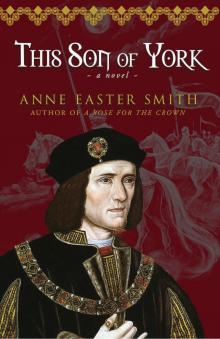 This Son of York
This Son of York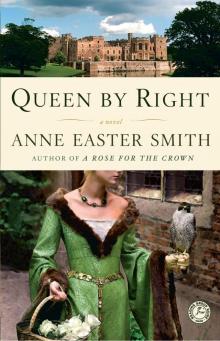 Queen By Right
Queen By Right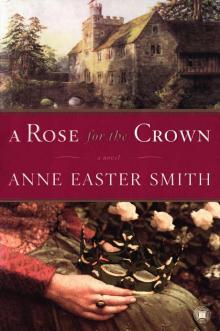 A Rose for the Crown: A Novel
A Rose for the Crown: A Novel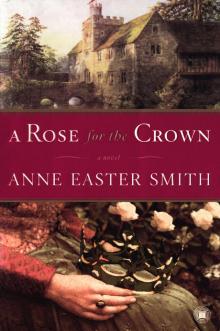 A Rose for the Crown
A Rose for the Crown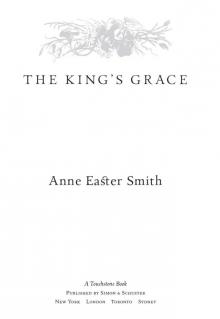 The King's Grace
The King's Grace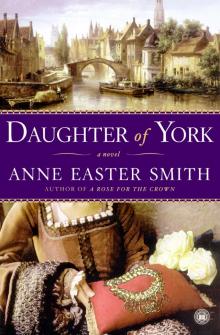 Daughter of York
Daughter of York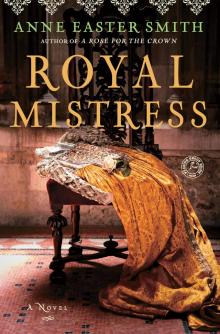 Royal Mistress
Royal Mistress